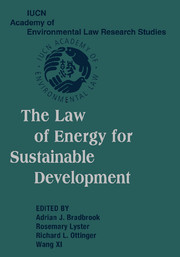Book contents
- Frontmatter
- Contents
- Acknowledgments
- Message from Kofi A. Annan, Secretary-General, United Nations
- Introduction – A Global Learned Society to Address Earth's Evolution: The IUCN Academy of Environmental Law
- Public Lectures on International Environmental Law
- PART ONE SUSTAINABLE DEVELOPMENT AND THE ROLE OF ENERGY LAW
- 1 Development and Energy
- 2 The Imperatives of Energy for Sustainable Development
- 3 2020 Energy Demand of China and Energy Conservation
- 4 Sustainable Development and the Marrakech Accords
- 5 Ethical Implications
- 6 Technological Implications
- PART TWO LEGAL ISSUES IN CONTEMPORARY ENERGY LAW
- PART THREE INTERNATIONAL ENERGY LAW
- PART FOUR COMPARATIVE ENERGY LAW
- PART FIVE ELECTRICITY RESTRUCTURING
- PART SIX FINANCING FOR SUSTAINABLE ENERGY
- PART SEVEN CIVIL SOCIETY AND THE PROCEDURAL REQUIREMENTS OF ENERGY LAW FOR SUSTAINABLE DEVELOPMENT
- Index
4 - Sustainable Development and the Marrakech Accords
Published online by Cambridge University Press: 10 August 2009
- Frontmatter
- Contents
- Acknowledgments
- Message from Kofi A. Annan, Secretary-General, United Nations
- Introduction – A Global Learned Society to Address Earth's Evolution: The IUCN Academy of Environmental Law
- Public Lectures on International Environmental Law
- PART ONE SUSTAINABLE DEVELOPMENT AND THE ROLE OF ENERGY LAW
- 1 Development and Energy
- 2 The Imperatives of Energy for Sustainable Development
- 3 2020 Energy Demand of China and Energy Conservation
- 4 Sustainable Development and the Marrakech Accords
- 5 Ethical Implications
- 6 Technological Implications
- PART TWO LEGAL ISSUES IN CONTEMPORARY ENERGY LAW
- PART THREE INTERNATIONAL ENERGY LAW
- PART FOUR COMPARATIVE ENERGY LAW
- PART FIVE ELECTRICITY RESTRUCTURING
- PART SIX FINANCING FOR SUSTAINABLE ENERGY
- PART SEVEN CIVIL SOCIETY AND THE PROCEDURAL REQUIREMENTS OF ENERGY LAW FOR SUSTAINABLE DEVELOPMENT
- Index
Summary
INTRODUCTION
Global warming is a paradigmatic sustainable development challenge. Greenhouse gases (GHGs) are emitted by a vast array of human activities that range from burning fossil fuels for electricity, heat, transportation, cooking, industrial, commercial, and governmental activities, to raising cows for meat and dairy products, growing rice, transporting natural gas, mining coal, and using fertilizer to grow the food we eat. The cumulative effect of the increased atmospheric concentration of GHGs is that more heat from the sun is trapped in the atmosphere, thereby warming the earth and modifying its climate. The climate change resulting from anthropogenic GHG emissions will adversely affect, among other things, public health, agriculture, weather patterns, water supplies, sea levels, the habitability of the coastal regions of the world, ecosystem health, and biodiversity; and could result in catastrophic effects such as the disappearance of the Gulf Stream, and alterations of other ocean currents. Adaptation to the climate change will be hugely expensive, to the extent adaptation is possible. Reduction of GHG emissions to mitigate the degree and speed of warming will require modifying the way we produce and use energy, grow our food, and changing the underlying price and market assumptions that organize our economic and social lives.
Sustainable development, although a concept difficult to define precisely, seeks economic development that is ecologically sound, equitable as to both present and future generations, and promotes social welfare.
- Type
- Chapter
- Information
- The Law of Energy for Sustainable Development , pp. 56 - 73Publisher: Cambridge University PressPrint publication year: 2005

